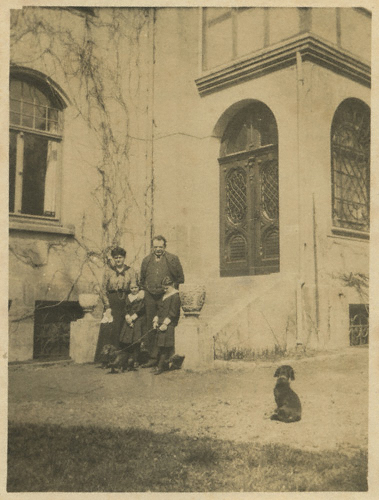1. Meiningen
His parting as conductor of the Meiningen court orchestra, which is as good as dissolved shortly after the outbreak of World War I, the death of Duke Georg II and the abandonment of the Requiem WoO V/9 lead into a deep creative crisis, from which he is only released by his move to Jena. Until then, he travels again and again (including three appearances in the Netherlands) and conducts, among other things, the Mozart Variations, Op. 132, and the Vaterländische Ouvertüre (Patriotic Overture), Op. 140, in a concert of the Royal Chapel in Berlin at the invitation of Richard Strauss.
2. Jena

Living in the quiet scholarly town of Jena in his first own villa from March and freed from courtly and professional constraints, Reger regains his compositional élan. To Karl Straube he writes: “[…] now the free, Jena style begins in Reger”1. The so-called late works as well as countless arrangements of music by others owe their genesis almost without exception to these first seven relaxed months, which must be considered Reger’s most settled months since he had become famous in one fell swoop at the Frankfurt Tonkünstlerfest in May 1904. Yet all of his creations of this period, from the Violin Sonata in C minor, Op. 139, through the Trios, Op. 141, to the last completed work, the Clarinet Quintet in A major, Op. 146, the Jena works speak less of serenity than of elegiac resignation that has given way to earlier rebellion. With the Einsiedler, Op. 144a, he confesses to his artistry – he, too, has wearily turned his back on the world (the first stanza of Eichendorff’s poem Der Einsiedler reads: “Come, comfort of the world, you silent night! | How gently you rise from the mountains, | the skies are all asleep, | only one skipper, weary of wandering, | sings his evening song across the sea | in praise of God in the harbour.”) and created a home for himself in music. With the parallel work Requiem (Hebbel), Op. 144b, which takes up elements of the discarded Latin Requiem (WoO V/9), he creates an intimate vision of death and oblivion, related not to the world catastrophe but to his own existence.
Postal items from this year whose sender or addressee is Max Reger.
Images from the Max Reger Foto Gallery that originate from this year and have a direct reference to Max Reger.
Reference
Max Reger Biography – 1915, in: Max-Reger-Portal, www.maxreger.info/biography/1915, Max Reger Biography Data, V. 3.2.0, last check: 16th December 2025.